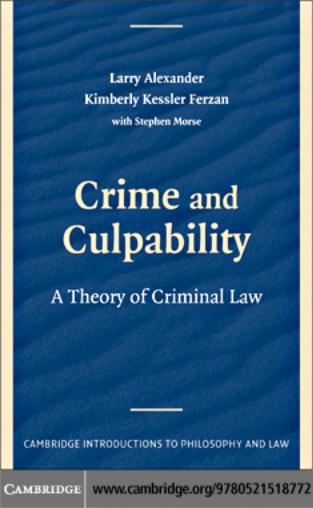
- •Contents
- •Acknowledgments
- •I. The Criminal Law and Preventing Harm
- •II. Questions about Retributivism
- •A. WEAK, MODERATE, OR STRONG RETRIBUTIVISM?
- •B. MEASURING DESERT
- •C. THE STRENGTH OF THE RETRIBUTIVIST SIDE CONSTRAINT
- •D. THE FREEWILL-DETERMINISM DEBATE
- •E. CHOICE OR CHARACTER?
- •III. Conclusion
- •I. Unpacking Recklessness
- •II. Folding Knowledge and Purpose into Recklessness
- •A. KNOWLEDGE
- •B. PURPOSE
- •A. UNDERSTANDING INSUFFICIENT CONCERN
- •1. How Many Categories Do We Need?
- •2. Indifference Compared
- •3. Bizarre Metaphysical Beliefs and Culpability
- •B. ASSESSING THE RISK
- •1. The Holism of Risk Assessment
- •2. Opaque Recklessness
- •3. Genetic Recklessness
- •C. REASONS AND JUSTIFICATION
- •E. RECKLESSNESS AND ACT AGGREGATION
- •IV. Proxy Crimes
- •I. Why Negligence Is Not Culpable
- •A. SIMONS’S CULPABLE INDIFFERENCE
- •B. TADROS’S CHARACTER APPROACH
- •C. GARVEY’S DOXASTIC SELF-CONTROL THEORY
- •III. The Strongest Counterexample to Our Position
- •IV. The Arbitrariness of the Reasonable-Person Test
- •A. EVISCERATING THE OFFENSE-DEFENSE DISTINCTION
- •B. ELIMINATING THE WRONGDOING-CULPABILITY DISTINCTION
- •C. SUMMARY
- •II. Socially Justifying Reasons
- •A. IN GENERAL: THE LESSER-EVILS PARADIGM
- •1. The General Consequentialist Structure of Lesser-Evil Choices
- •2. Deontological Constraints on the Consequentialist Calculus
- •4. The Special Case of Lesser versus Least Evil
- •2. Third-Party Focus
- •4. The Risk That a Possible Culpable Aggressor Is Not One
- •5. Culpable Aggressors versus Culpable Aggressors
- •6. The Provoked Culpable Aggressor
- •7. The Range of Culpable Actors
- •C. SOCIALLY JUSTIFYING REASONS: SOME CONCLUDING REMARKS
- •III. Excuses
- •A. PERSONAL JUSTIFICATIONS AND HARD CHOICES
- •2. Expanding Duress
- •3. Duress, Preemptive Action, and Proportionality
- •4. Implications
- •B. EXCULPATORY MISTAKES
- •C. IMPAIRED RATIONALITY EXCUSES
- •1. Excuses versus Exemptions
- •2. Insanity
- •3. Degraded Decision-Making Conditions
- •IV. Mitigating Culpability
- •A. THE PERPLEXING PARTIAL EXCUSE OF PROVOCATION
- •2. Provocation as Excuse (1): The Character Explanation
- •3. Provocation as Excuse (2): The Decision-Making Explanation
- •B. ASSIMILATING PROVOCATION
- •C. HOW MITIGATION WORKS
- •I. The Irrelevance of Results
- •II. The Intuitive Appeal of the “Results Matter” Claim
- •III. “Results Matter” Quandaries
- •B. CAUSAL CONUNDRUMS
- •IV. Free Will and Determinism Reprised
- •VI. The Immateriality of Results and Inchoate Crimes
- •I. Our Theory of Culpable Action
- •A. PRELIMINARY CONSIDERATIONS
- •B. INTENTIONS
- •1. Are Intentions Acts?
- •2. Why Intentions Are Not Culpable Acts
- •C. SUBSTANTIAL STEPS
- •D. DANGEROUS PROXIMITY
- •E. LAST ACTS
- •A. WHEN PREPARATORY ACTS ARE ALSO LAST ACTS
- •B. LIT-FUSE ATTEMPTS
- •C. IMPOSSIBLE ATTEMPTS
- •D. RECONCEPTUALIZING OTHER INCHOATE CRIMES
- •I. The Unit of Culpable Action
- •A. RETHINKING CULPABLE ACTION
- •B. FROM VOLITIONS TO WILLED BODILY MOVEMENTS
- •II. Culpability for Omissions
- •B. ELEMENTS OF OMISSIONS LIABILITY
- •C. THE CRIME OF POSSESSION
- •III. Acts, Omission, and Duration
- •A. RISKY ACTS AND FAILURES TO RESCUE
- •B. CULPABILITY AND DURATION
- •IV. Individuating Crimes
- •A. TYPES OF CRIMES
- •1. A Brief Normative Defense
- •2. Disentangling Legally Protected Interests
- •B. TOKENS OF CRIMES
- •1. Counting Willed Bodily Movements
- •2. Volume Discounts
- •3. Analyzing Continuous Courses of Conduct
- •I. An Idealized Culpability-Based Criminal Code
- •A. LEGALLY PROTECTED INTERESTS
- •1. A Normative Defense of Unpacking Crimes
- •2. Which Interests?
- •B. CALCULATING CULPABILITY
- •1. Some Preliminaries
- •2. A First Attempt
- •II. From an Idealized Code to a Practical One: Implementing Our Theory in “the Real World”
- •A. WHAT WE ARE SEEKING TO REPLACE
- •2. Do Our Current Criminal Codes Contain Rules?
- •B. IMPLEMENTING A PRACTICAL CODE
- •1. Rules versus Standards: In General
- •2. The Argument for Rules over Standards
- •3. Problems with Rules
- •4. An Empirical Experiment
- •C. INEVITABLE PROXY CRIMES
- •1. Recognizing the Alternatives
- •2. Enacting Proxy Crimes
- •D. LEGALITY QUESTIONS
- •1. Notice
- •2. Constraining Power
- •E. ENFORCEMENT PROBLEMS
- •1. Do We Unjustly Empower Prosecutors?
- •2. Reconciling Our Act Requirement with Concerns about Law Enforcement
- •F. PROCEDURAL, EVIDENTIARY, AND SENTENCING CONSIDERATIONS
- •1. Burdens of Proof and Evidentiary Rules
- •2. Plea Bargaining
- •3. Sentencing Considerations
- •Epilogue
- •General instructions:
- •Defense of self and others:
- •Bibliography
- •Primary Materials
- •Secondary Materials
- •Index

This page intentionally left blank

Crime and Culpability
A Theory of Criminal Law
This book presents a comprehensive overview of what the criminal law would look like if organized around the principle that those who deserve punishment should receive punishment commensurate with, but no greater than, that which they deserve. Larry Alexander and Kimberly Kessler Ferzan argue that desert is a function of the actor’s culpability and that culpability is a function of the risks of harm to protected interests that the actor believes he is imposing and his reasons for acting in the face of those risks. The authors deny that resultant harms, as well as unperceived risks, affect the actor’s desert. They thus reject punishment for inadvertent negligence as well as for intentions or preparatory acts that are not risky. Alexander and Ferzan discuss the reasons for imposing risks that negate or mitigate culpability, the individuation of crimes, and omissions. They conclude with a discussion of rules versus standards in criminal law and offer a description of the shape of criminal law in the event that the authors’ conceptualization is put into practice.
Larry Alexander is the Warren Distinguished Professor of Law at the University of San Diego. He has authored and coauthored, in addition to several anthologies and 170 articles, essays, and book chapters, five books, most recently Is There a Right to Freedom of Expression? and, with Emily Sherwin, Demystifying Legal Reasoning. He is also past president of AMINTAPHIL, a founding coeditor of the journal Legal Theory, and codirector of the Institute for Law and Philosophy at the University of San Diego.
Kimberly Kessler Ferzan is Associate Dean for Academic Affairs and Professor of Law at Rutgers University School of Law, Camden, and is Associate Graduate Faculty in the Philosophy Department, Rutgers University, New Brunswick. The author of numerous articles, essays, and book chapters on criminal law theory, she is cofounder and codirector of the Rutgers-Camden Institute for Law and Philosophy.
Cambridge Introductions to Philosophy and Law
Editors
William A. Edmundson, Georgia State University
Brian Bix, University of Minnesota
This introductory series of books provides concise studies of the philosophical foundations of law, of perennial topics in the philosophy of law, and of important and opposing schools of thought. The series is aimed principally at students in philosophy, law, and political science.
Other Books in the Series
An Introduction to Rights, by William A. Edmundson
Objectivity and the Rule of Law, by Matthew H. Kramer
Demystifying Legal Reasoning, by Larry Alexander and Emily Sherwin

Crime and Culpability
A Theory of Criminal Law
LARRY ALEXANDER
University of San Diego School of Law
KIMBERLY KESSLER FERZAN
Rutgers University School of Law, Camden
With contributions by
STEPHEN J. MORSE
University of Pennsylvania Law School
CAMBRIDGE UNIVERSITY PRESS
Cambridge, New York, Melbourne, Madrid, Cape Town, Singapore, São Paulo
Cambridge University Press
The Edinburgh Building, Cambridge CB2 8RU, UK
Published in the United States of America by Cambridge University Press, New York
www.cambridge.org
Information on this title: www.cambridge.org/9780521518772
© Larry Alexander and Kimberly Kessler Ferzan 2009
This publication is in copyright. Subject to statutory exception and to the provision of relevant collective licensing agreements, no reproduction of any part may take place without the written permission of Cambridge University Press.
First published in print format 2009
ISBN-13 978-0-511-50709-0 eBook (EBL)
ISBN-13 978-0-521-51877-2 hardback
ISBN-13 978-0-521-73961-0 paperback
Cambridge University Press has no responsibility for the persistence or accuracy of urls for external or third-party internet websites referred to in this publication, and does not guarantee that any content on such websites is, or will remain, accurate or appropriate.
For Elaine, the best criminal lawyer I know, L. A.
For Griffin,
K. K. F.

Contents
Acknowledgments |
page xiii |
PART ONE Introduction: Retributivism and |
|
the Criminal Law |
|
1 Criminal Law, Punishment, and Desert |
3 |
I The Criminal Law and Preventing Harm |
4 |
II Questions about Retributivism |
7 |
III Conclusion |
17 |
PART T WO The Culpable Choice |
|
|
2 The Essence of Culpability: Acts Manifesting Insufficient |
|
|
Concern for the Legally Protected Interests of Others |
23 |
|
I |
Unpacking Recklessness |
25 |
II |
Folding Knowledge and Purpose into Recklessness |
31 |
III |
A Unified Conception of Criminal Culpability |
41 |
IV Proxy Crimes |
66 |
|
ix
x |
|
CON T EN TS |
3 Negligence |
69 |
|
I Why Negligence Is Not Culpable |
70 |
|
II |
Attempts at Narrowing the Reach of Negligence Liability 71 |
|
III |
The Strongest Counterexample to Our Position |
77 |
IV The Arbitrariness of the Reasonable-Person Test |
81 |
|
4 Defeaters of Culpability |
86 |
|
I |
Justifications and Excuses: Reorienting the Debate |
88 |
II |
Socially Justifying Reasons |
93 |
III |
Excuses |
134 |
IV Mitigating Culpability |
162 |
|
PART THR EE The Culpable Act |
|
|
5 Only Culpability, Not Resulting Harm, Affects Desert |
171 |
|
|
I The Irrelevance of Results |
172 |
II The Intuitive Appeal of the “Results Matter” Claim |
175 |
|
III “Results Matter” Quandaries |
178 |
|
IV Free Will and Determinism Reprised |
188 |
|
V The Immateriality of Results and Ancestral |
|
|
|
Culpable Acts |
191 |
VI The Immateriality of Results and Inchoate Crimes |
192 |
|
VII Inculpatory Mistakes and the Puzzle of Legally |
|
|
|
Impossible Attempts |
194 |
6 When Are Inchoate Crimes Culpable and Why? |
197 |
|
I Our Theory of Culpable Action |
198 |
|
II Some Qualifications and Further Applications |
216 |
|
7 The Locus of Culpability |
226 |
|
I The Unit of Culpable Action |
228 |
|
II Culpability for Omissions |
234 |
|
III Acts, Omission, and Duration |
241 |
|
IV Individuating Crimes |
244 |
|
CON T EN TS |
xi |
PART FOUR A Proposed Code |
|
8 What a Culpability-Based Criminal Code Might |
|
Look Like |
263 |
I An Idealized Culpability-Based Criminal Code |
264 |
II From an Idealized Code to a Practical One: Implementing |
|
Our Theory in “the Real World” |
288 |
Epilogue |
325 |
Appendix |
327 |
Bibliography |
331 |
Index |
349 |
